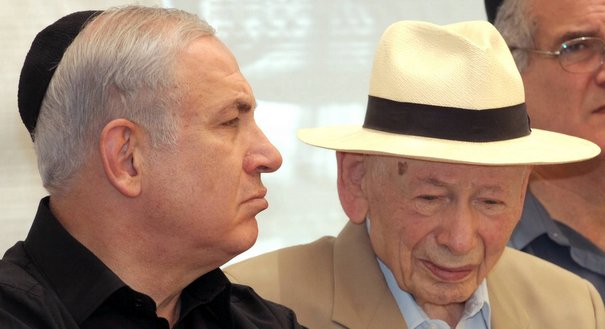Benzion Netanyahu, the father of Israel’s Prime Minister, Benjamin Netanyahu died this week in Jerusalem at the age of 102.
Busy almost to the end, B. Netanyahu, the name under which he authored his books, was never afraid to speak his mind.
He was born into a Zionist family in Warsaw, 1910.
He was also an ardent believer in Greater Israel, later campaigning unsuccessfully against the United Nations Partition Plan for Palestine of 1947 that led to the establishment of the State of Israel.
B. Netanyahu, a secular Jew, never drifted from that view, or that peace was impossible with the Arabs, or that the settlements were the answer, or that giving up land for peace was right.
Being such an unconventional hawk was one thing.
But being a hawk shaped by an intimate, scholarly view of Jewish history and the uncertainty of his own place in Israeli society was another.
Both aspects help to explain the legacy B. Netanyahu bequeathed to his son -- a legacy not often accessible to Europeans.
B. Netanyahu was an Ashkenazi Jew, one of the many who fled Europe to build the new state of Israel after the catastrophe of the Holocaust.
In the early years, the Ashkenazim dominated Israel. With the Labour party, they formed a mostly left leaning elite sharing socialist views and a vision of a strong, all encompassing state. They dominated the top posts in academia and most aspects of public life.
When millions of Sephardic Jews from the Middle East began arriving in Israel in the 1950s, there was a horrendous clash of cultures in the new state.
When the Sephardic Jews found themselves being treated as second class citizens in their new homeland, many turned to the right-wing Likud party because it was less elitist but also more suspicious of the Arab world.
B. Netanyahu found himself rejected by his own ethnic group, the Ashkenazim, because of his hardline views of Arabs.
But more importantly, he thought they begrudged him recognition for his academic work because he went against their established views on the history of the Jews in Spain.
In the 1940s, B. Netanyahu had begun to delve into the origins of the Spanish Inquisition that led in 1491 to the forcible expulsion of Jews and Muslims by the Catholic King Ferdinand and Queen Isabella.
At that time, there was one overriding historical interpretation of the Spanish Inquisition. Sephardic Jews in Spain, it was thought, had been forced to convert to Catholicism in order to survive.
These Sephardic Jews called Marranos, so the interpretation went, converted to save themselves and many continued to live a double life, practicing their Jewish faith in secret.
The inquisition was set up to sniff out false converts, beginning with the Jewish heresy to go on to the suspicion of other deviations from the faith.
But B. Netanyahu, in his seminal work, “The Origins of the Spanish Inquisition in fifteenth century Spain”, debunked this theory. (1995 Random House)
He argued that most of the Jews who converted and assimilated did so willingly.
They “wished to merge with the Christian society, educate their children as fully fledged Christians, and remove themselves from anything regarded as Jewish, especially in the field of religion” he wrote.
So by 1481, when the Inquisition was established, there was just a small minority of Jews left in Spain.
What sense was there in establishing the Inquisition? B. Netanyahu asked in his ‘Origins of the Inquisition’.
He argued that the Inquisition was motivated by racism and economic jealousy so as to underpin the absolute power of the Spanish Kingdom. It had little to do with stamping out what the Catholics regarded as heresies.
Depending on how you interpret B. Netanyahu’s book, it has two ‘morals’.
The first is that assimilation does not work. It did not save the Sephardi Jews. Nor did it save those Ashkenazi Jews who had assimilated during the 19th and 20th century from the Holocaust. Jews, so B. Netanyahu believed, will always be subject to some kind of racism.
The second is that the Jews are naïve when it comes to heeding warnings. They ignored calls by the right-wing leader Ze’ev Jabotinsky to get the Jews out of Europe before it was too late.
And despite their victories in 1948 and 1967, these created a false sense of security for the Jews, B. Netanyahu believed. The Jewish State needed to protect Jews from themselves in order to protect their identity.
Now look at how those thoughts might lie at the foundation of Benjamin Netanyahu’s politics, a man shaped both by his father’s rightwing views and his ostracism from the Ashkenazi community.
Both B. Netanyahu and his son, Benjamin believed there was a kind of conspiracy against B. Netanyahu because of his views. When he applied for an academic post at the Hebrew University, he was turned down.
Benjamin Netanyahu, many think, still carries a chip on his shoulder because of that. But more importantly, he has inherited his father’s political and historical convictions. For instance with regard to Iran, Benjamin Netanyahu clearly believes that compromises are very costly, but won’t work.
“We are very simply in danger of extermination today”, the prime minister said recently. “Not just existential danger but truly in danger of extermination. They think the extermination, the Holocaust, is over. It isn’t. It goes on all the time.”
Benzion Netanyahu was, first of all, a great academic thinker whose work shed new light on a particularly dark chapter of European history.
Benjamin Netanyahu, in contrast, is first and foremost a politician. Will the unwillingness to bend that was a virtue in the father serve his son in a way that will make Israel worthy of its leaders?






